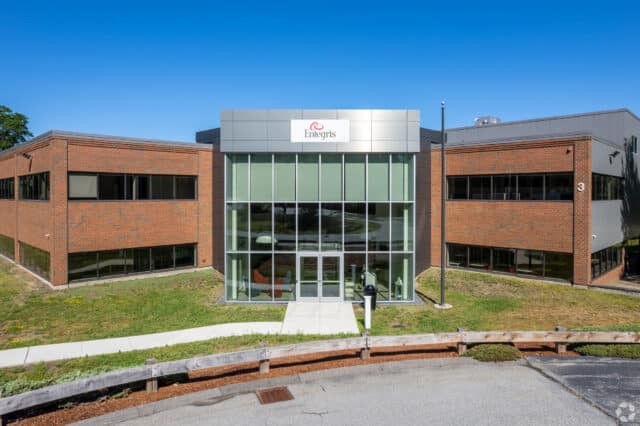
Growth of Massachusetts’ clean energy sector could change the landscape of suburban office parks. iStock photo
Gov. Maura Healey’s proposal to invest $1.3 billion in Massachusetts’ clean energy sector could revive suburban business parks struggling in the hybrid work era.
Healey estimates the proposed climate tech bill to subsidize clean energy companies could create 7,000 jobs, potentially throwing a lifeline to commercial real estate developers studying best future uses for moribund office properties. While office tenants downsize, developers and brokers see a growing source of tenant demand for flex properties including a mix of office, research and light manufacturing space.
“Every landlord is trying to figure out how to take these office buildings that are underperforming, and capture the demand,” said Alison Powers, an executive vice president at JLL who specializes in the MetroWest suburban market. “Obviously the demand is down for office, but we are seeing the bright spots with flex properties.”
Healey travels to Rome this week to meet with Italian business leaders and promote the Bay State’s clean energy economy’s connections with overseas partners such as Enel Group, a clean energy facility operator with U.S. headquarters in Andover.
Last week, the Legislature took up Healey’s proposed 10-year climate tech initiative, which would include $300 million in tax credits and incentives for climate tech companies, $200 million to support offshore wind, $200 million to support early deployment projects and $300 million in operating funds for the Massachusetts Clean Energy Center (MassCEC). The bill also increases wind energy tax credits by $350 million.
The initiative seeks to leverage Massachusetts’ existing climate economy, which is currently responsible for an estimated 1,440 jobs, according to a report released this month by the UMass Donahue Institute.
Massachusetts already has the nation’s second-largest climate tech cluster, according to a recent report by Deloitte, comprising 8 percent of the national industry.
While Beacon Hill legislators debate the merits of Healey’s bill, federal funding is already trickling down to Bay State industry. The Inflation Reduction Act is steering $369 billion in federal funding to the clean energy sector over the next decade.
One recipient is a Billerica clean energy company that signed one of the largest recent lease transactions in the suburbs. Nuvera Fuel Cells was awarded $30 million in funding from the U.S. Department of Energy and $14 million in investment tax credits to increase production of its hydrogen fuel cells used by heavy equipment vehicles. The company renewed its lease for 111,000 square feet at 129 Concord Road in Rivertech Park, where it produces more than 2,000 fuel cell stacks per year.

Nuvera Fuel Cells was awarded $30 million in funding from the U.S. Department of Energy and $14 million in investment tax credits to increase production of hydrogen fuel cells. Photo courtesy of LoopNet
A Plan B for Suburban Office Parks
The clean energy sector’s growth could generate new demand in the suburbs, where office landlords continue to struggle to attract significant leases.
Boston’s nearly 106 million-square-foot suburban office market had an 18.4 percent vacancy rate at the end of the first quarter, according to CBRE data, and recorded over 740,000 square feet of negative absorption.
Some recent transactions illustrate the potential for office-to-flex space makeovers, adding research and manufacturing space, and could be a model for the future of suburban business parks.
Boston-based Rhino Capital acquired a former EMC data center and office building in Hopkinton last month for $4.1 million and received $8 million in financing for a conversion into flex space. A portion of the second floor will be removed to create assembly space for audio equipment manufacturer Bose Professional.

Steve Adams
Two-story office buildings with large floor plates are particularly suitable for such conversions, brokers say. But properties also require robust power capacity or upgrades to accommodate R&D uses, particularly in the clean energy sector. Minimum 18-foot clear heights are needed to accommodate light manufacturing and R&D uses.
Developers seeking to lure flex tenants still need to have a substantial lease commitment to move ahead with conversions, amid the tighter lending climate. There’s been little track record for successful speculative R&D conversions so far, noted Mark Fallon, director of research and strategy at brokerage Hunneman. But the potential payoff is securing rents that are comparable to suburban office space, Fallon said, depending upon the tenants’ power requirements.
Brokerage Avison Young is tracking approximately 400,000 square feet of active requirements in the suburbs, mostly outside Route 128, for companies in such sectors of clean energy and robotics.
“The common element is they require a lot of power, and can your building support the power these tenants need?” said Tucker White, Avison Young’s U.S. life science lead of market intelligence. “Beyond that, when you look at clean tech, sometimes as part of your mission you don’t want to go to a town that’s getting the power from natural gas. You’re beholden to being on a grid that is more sustainable and has clean energy.”
Healey’s Climate Push Could Jumpstart Suburban Properties #Healeys #Climate #Push #Jumpstart #Suburban #Properties
Source Link: https://bankerandtradesman.com/healeys-climate-push-could-jumpstart-suburban-properties/
Healey’s Climate Push Could Jumpstart Suburban Properties:
Growth of Massachusetts’ clean energy sector could change the landscape of suburban off…
